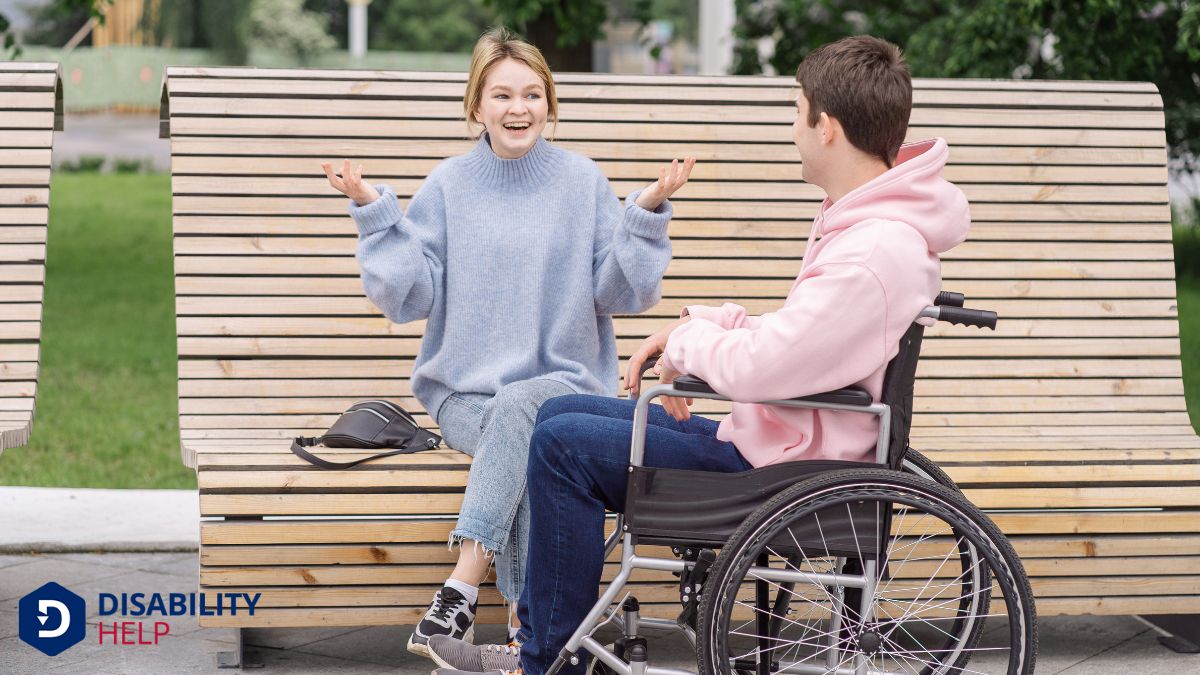When it comes to inquiring about someone's disability, we must tread cautiously. Respecting personal boundaries and understanding privacy expectations are fundamental. It's crucial to acquire consent and make sure that sharing is a choice, not a requirement. Context, including our relationship with the individual and the environment, plays a vital role. We need to take into account why we're asking and if it's pertinent. By creating an environment where open communication is discretionary, we demonstrate respect and empathyThe ability to understand and share the feelings of another, particularly important in understanding.... It's all about listening and prioritizing support over inquisitiveness. With these concepts in mind, we can better navigate such conversations with respect and mindfulness.
Key Takeaways
- Always seek consent before asking about someone's disability to respect their privacy and autonomy.
- Consider the context and relevance before inquiring about a person's disability.
- Respect an individual's choice not to disclose details about their disability.
- Use empathy and sensitivity when discussing disabilities to foster a respectful environment.
- Focus on creating a safe space where sharing about disabilities is entirely optional.
Understanding Personal Boundaries

Understanding personal boundaries is vital when discussing someone's disability. When we approach these conversations, we must remember that everyone's comfort level and privacy expectations can vary significantly. It's pivotal that we respect these differences.
We shouldn't assume that because we're curious, it's appropriate to ask questions about an individual's disability. Instead, we should focus on creating a respectful environment where people feel safe sharing only if they choose to.
As we engage in conversations, let's consider how we'd feel if someone asked us deeply personal questions without invitation. This perspective helps us appreciate the significance of boundaries. It also reminds us that consent is key in any discussion—especially one about personal matters. We should always seek permission before delving into sensitive topics.
The Role of Context
The role of context is pivotal when discussing someone's disability, as it shapes how our questions are received and perceived. We must consider the setting, our relationship with the person, and the purpose behind our inquiry. Are we in a private or public space? Are we close friends or mere acquaintances? Each factor influences whether our questions come off as intrusive or genuinely supportive.
When we think about context, we should reflect on why we want to know about their disability. Are we motivated by curiosity, or are we attempting to provide assistance? Understanding our intent can help us determine if the question is appropriate. It's vital to be sensitive, acknowledging that discussing disabilities can be deeply personal and possibly uncomfortable for some individuals.
Additionally, the timing of our questions plays a significant role. Bringing up the topic during a casual encounter mightn't be suitable. However, in a conversation focused on accessibilityThe design of products, devices, services, or environments to be usable by people with disabilities.... or support, it might be more relevant.
Importance of Consent
When discussing someone's disability, it's pivotal we prioritize obtaining their consent before delving into personal details. Asking about one's disability isn't just a casual inquiry; it touches on personal experiences and challenges that can be deeply meaningful. We must recognize that sharing such information is a choice, not an obligation. Consent empowers individuals, allowing them to determine when and how they share their stories.
Understanding consent's importance also means acknowledging the impact our questions can have. Without consent, we risk invading privacy and possibly causing discomfort or distress. It's vital to approach these conversations with empathy, ensuring that the individual feels respected and understood. By seeking consent, we demonstrate our respect for their autonomy and dignity.
Moreover, consent fosters trust. When we ask for permission, we're showing that we value their comfort over our curiosity. This approach not only strengthens our relationships but also creates a more inclusive and supportive environment.
Let's remember that it's not just about getting information; it's about building connections based on mutual respect and understanding. By prioritizing consent, we honor the individual's right to share their story on their terms.
Perspectives From Individuals
Hearing directly from individuals with disabilities provides invaluable insights into their lived experiences and perspectives. When we listen, we not only gain a deeper understanding of their challenges but also learn about their triumphs and resilienceThe ability of individuals with disabilities to cope with and adapt to challenges and adversity..
Many individuals with disabilities express that being asked about their disabilities can feel intrusive, especially if this is done without context or consideration. It's crucial to remember that each person's experience is unique, and some might be open to discussing their disability, while others might prefer privacy.
We should approach these conversations with empathy and respect, recognizing that our curiosity should never overshadow another person's comfort or dignity. Creating a safe space where individuals feel empowered to share only what they wish to is vital. By doing so, we demonstrate our willingness to learn and our commitment to fostering inclusivity.
When we focus on understanding rather than labeling, we break down barriers and build stronger connections. It's about respecting boundaries and acknowledging that everyone has the right to their own story. By valuing each person's voice, we can contribute to a more inclusive and compassionate community.
Let's make sure our actions reflect sensitivity and understanding.
Expert Opinions on Etiquette
As we explore expert opinions on etiquette, it's pivotal to respect privacy and boundaries when discussing someone's disability. Experts suggest we should encourage open communication by listening actively and ensuring people feel comfortable sharing what they wish.
Let's consider how these practices can guide our interactions and foster more respectful conversations.
Respect Privacy and Boundaries
Maneuvering conversations about disability requires a delicate balance of respect for privacy and an understanding of personal boundaries. It's essential that we approach these discussions with empathy and mindfulness, ensuring we respect the other person's comfort level. Here's how we can maintain this balance:
- Assess the need to know: Before asking about someone's disability, let's consider whether the information is necessary for the situation. If it's not directly relevant, it might be best to refrain from asking.
- Be observant: Sometimes, body language can signal whether someone is comfortable discussing their disability. If they appear hesitant or uneasy, it's our cue to change the subject and respect their space.
- Use inclusive language: We should use language that honors the individual's identity and preferences. If we're uncertain, we can ask them how they'd like to be referred to without probing into their personal experiences.
- Respect silence: If someone chooses not to disclose details about their disability, it's important to accept their decision without pressuring them. Silence can convey a lot about their privacy needs.
Encourage Open Communication
Let's foster open communication by creating a welcoming environment where individuals feel safe to share their experiences if they choose to. This involves being mindful of our language and actions. By actively listening and showing genuine interest, we can demonstrate empathy and understanding. We should remember that not everyone may want to discuss their disability, and that's perfectly okay. The key is to let them know we're open to conversation without pressure.
It's important to ask ourselves, "How can we better support those around us?" We can start by being aware of our own assumptions and biases. When someone decides to share their story, we should focus on what they're saying rather than forming judgments. We should ask thoughtful questions that reflect our interests and respect their comfort levels.
We should also express gratitude when someone entrusts us with personal details about their life. This acknowledges their courage and fosters a deeper connection.
In our workplaces, communities, and social circles, let's champion open discussions that celebrate diversityThe inclusion of individuals from a wide range of backgrounds, including people with disabilities. and promote understanding. By doing so, we create spaces where everyone feels valued and empowered to share when they're ready.
Promoting Inclusivity and Respect
To foster an environment of inclusivity and respect, we must be mindful of how we approach conversations about disabilities. It's vital that we create spaces where everyone feels valued and respected. This means considering our words and actions carefully. Understanding that not everyone is comfortable discussing personal aspects of their lives is key.
Here are some ways we can promote inclusivity and respect:
- Listen Actively: When someone chooses to share their experiences, we should listen attentively and without interruption. This shows that we value their perspective and are open to learning.
- Avoid Assumptions: It's important not to make assumptions about a person's abilities or needs based on appearances or stereotypes. Everyone's experience is unique, and assumptions can lead to misunderstandings.
- Use Inclusive Language: We should use language that respects people's identities and experiences. This includes using person-first languageA way of speaking that puts the person before the disability, such as "person with a disability" ins... and avoiding terms that may be considered offensive or outdated.
- Educate Ourselves: Taking the initiative to learn about different disabilities can help us understand and support each other better. This shows that we're committed to fostering an inclusive community.
Alternatives to Direct Questions

When we're curious about someone's disability, it's important to approach the topic with sensitivity and tact. Direct questions can sometimes feel intrusive or uncomfortable, so we should consider alternatives that foster a more respectful dialogue. One way to do this is by focusing on the person's experiences or needs rather than the disability itself.
For example, we might ask, "Is there anything I can do to make this space more comfortable for you?" This question shows our willingness to accommodate without prying into personal details.
Another approach is to create an environment where individuals feel comfortable sharing when they're ready. We can achieve this by being open about our own experiences or by discussing general topics related to accessibility and inclusionThe practice of creating environments in which any individual or group can be and feel welcomed, res....
Saying something like, "I read an interesting article about accessibility improvements recently," can open up a conversation naturally, allowing the person to share if they choose to.
Let's remember that empathy and patience go a long way. By respecting boundaries and focusing on support rather than curiosity, we demonstrate our genuine commitment to understanding and inclusivity. This approach not only strengthens our relationships but also contributes to a more inclusive society.
Conclusion
In handling conversations about disabilities, we must prioritize respect, consent, and understanding. Let's remember that personal boundaries are essential, and context matters greatly. Instead of directly inquiring about someone's disability, we can foster an inclusive environment by listening, learning, and being empathetic. By valuing each individual's comfort and perspective, we promote a culture of respect and inclusivity. Together, we can create spaces where everyone feels valued and understood without the need for intrusive questions.






